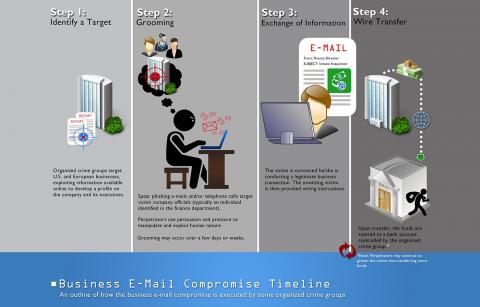Capitol Tech Celebrates Safer Internet Day
February 9, 2021Today, February 9, 2021, is the 18th annual Safer Internet Day, an initiative that began as the EU SafeBorders project and is now championed by the Insafe network1. Safer Internet Day was started in 2004 to “raise awareness of emerging online issues and current concerns”1. This year’s theme is "Together for a better internet," so Capitol Tech wanted to join the 170 countries who celebrate Safer Internet Day around the world2.
As many of our tech savvy students know, the internet opens up a plethora of possibilities for careers and recreation, but it also introduces users to a host of potential vulnerabilities.
Kaspersky, a cybersecurity company, advises that all internet users be judicious in material they post, never share personal information, use strong passwords, browse the internet only using known and protected connections, and maintain privacy settings, and antivirus software updated3. These best practices are echoed across the internet to help users protect identifying information and to make sure future job prospects aren’t impacted by past decisions.
For many job seekers, social media can provide a window into a company’s culture, ethos, and goals, but many forget that the window goes both ways. In fact, 37% of the over 2,300 hiring and human resources managers surveyed by CareerBuilder.com reported using social media to screen job applicants and 34% said content they found on applicants’ social media has caused them not to hire the candidate4. The report also revealed that 65% of respondents said they looked for professionalism in social posts, 51% reported analyzing applicant’s social media to see if they were a good fit for the company, and 45% were looking for additional information on their skills and qualifications4.
In a Forbes.com article, Rosemary Haefner, vice president of human resources at CareerBuilder said:
“Social media is a primary vehicle of communication today, and because much of that communication is public, it’s no surprise some recruiters and hiring managers are tuning in.”4
In addition to the damage that individuals could do to themselves by limiting job prospects with their social media content, the Federal Bureau of Investigation (FBI), reports there are numerous types of cybercrimes that cyber criminals may perpetrate to inflict harm on internet users for the criminals personal gain. Some of the most common crimes are Business e-mail compromise (BEC) scams, identity theft, ransomware, and spoofing and phishing5. BEC crimes, which the FBI says are one of the most financially damaging scams, occur when an email is sent by a person claiming to be some trusted third-party source, such as your bank or Amazon account, requesting information pertaining to your account like your account ID and password or billing information6.
The FBI produced the following graphic to represent the steps a criminal may take from the initial correspondence to the final step in which the criminal reaps financial benefit from the scam6.
The FBI also warns that scams centered around romance may rise around Valentine’s Day7. These scams, also called “confidence fraud,” revolve around criminals building trust with their victim who are looking for romantic interactions online, then exploiting that trust to reap some kind of benefit that is often a financial gain7.
In a press release issued by the FBI, James Langenberg, special agent in charge of the Albuquerque FBI Division, said:
“Social media has become a popular place to meet people, especially when COVID-19 restrictions make face-to-face gatherings difficult. Unfortunately, criminals know that’s where they can find victims, too. Anyone looking for love in cyberspace should make sure they keep their feet on the ground by educating themselves about the risks.”7
The FBI reports that nearly 24,000 “confidence fraud” cases were reported totaling over $605 million in lost funds from victims in 2020 alone7.
If you or someone you know have been the victim of a cybercrime the FBI requests that you tell your bank and credit card companies immediately, contact police, and file a complaint with the Internet Crime Complain Center (IC3).
For more information on how to protect yourself from scams while conducting online activity read Capitol Tech’s blog on Data Privacy Day or join the fight against cybercrime and cyber criminals by starting your career in Cyber and Information Security.
References
- Safer Internet Day. About Safer Internet Day. Retrieved from https://www.saferinternetday.org/about.
- Safer Internet Day. Together for a better internet. Retrieved from https://www.saferinternetday.org/.
- Kaperskey. (2020, March 30). Top 10 Internet Safety Rules & What Not to Do Online. Retrieved from https://usa.kaspersky.com/resource-center/preemptive-safety/top-10-internet-safety-rules-and-what-not-to-do-online.
- Forbes. (2013, April 16). How Social Media Can Help (Or Hurt) You In Your Job Search. Retrieved from https://www.forbes.com/sites/jacquelynsmith/2013/04/16/how-social-media-can-help-or-hurt-your-job-search/?sh=54589ec77ae2.
- Federal Bureau of Investigation. The Cyber Threat. Retrieved from https://www.fbi.gov/investigate/cyber.
- Federal Bureau of Investigation. Business Email Compromise. Retrieved from https://www.fbi.gov/scams-and-safety/common-scams-and-crimes/business-email-compromise.
- Federal Bureau of Investigation. (2021, February 11). Valentine’s Day a Good Time for a Warning About Romance Scams. Retrieved from https://www.fbi.gov/contact-us/field-offices/albuquerque/news/press-releases/valentines-day-a-good-time-for-a-warning-about-romance-scams.



